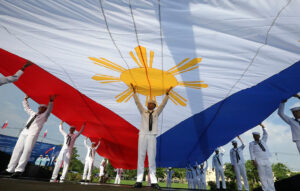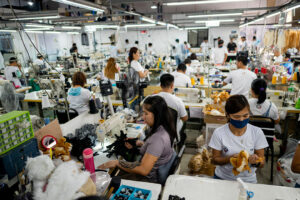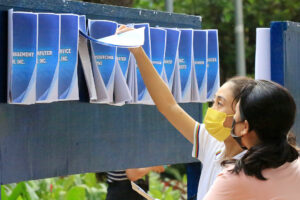Is there still hope?

• In the sphere of morality, we sense widespread confusion, indifference, apathy and helplessness because of murderous attacks against life, particularly against innocent ones. The culture of impunity, self-entitlement and loss of sense of sin is alarming.
• In ecology, we are constantly traumatized by the effects of disasters and tragedies due to climate emergencies, worsened by substandard and underfunded structures. Private interests are protected over the common good and the welfare of the marginalized, including indigenous peoples and poor communities.
• In the area of economy, increasing poverty, manifested by the rise of unemployment and prices of commodities and services, leads to a situation where the rich become richer, the poor become poorer and the powerful become more powerful.
• In the political realm, the scandalous misuse of public funds and resources; the questionable insertions, cuts, and adjustments in the national budget; and anti-poverty programs that promote a culture of patronage and mendicancy are truly disturbing. As the elections draw near, we see how platforms of popularity, dynasty and patronage are again exploited, making politics into a family business.
• In the area of security and international concerns, we witness how our sovereignty and national security are constantly threatened.
• In the field of communications, falsehood, misinformation and disinformation are weaponized against the truth.
• In the area of governance, we wonder whether there are still checks and balances.
May pag-asa pa nga ba? (Is there still hope?)
It might be the frenzied cacophony of voices of many Filipinos nowadays, some angry, some perplexed and incredulous, some crying out in pain in anxieties for what and where the country seems to be recklessly careening towards in the dark future.
The crescendo of protests peaked in two rallies held on Friday, Jan. 31 at the EDSA People Power Revolution monument, along White Plains Avenue in Quezon City. “Among the groups that participated in the rally were Akbayan, Magdalo, Tindig Pilipinas and the family of victims in the Duterte administration’s bloody drug war. Most of them wore white shirts and carried placards and banners calling to oust the Vice President over alleged misuse of confidential funds — an allegation Duterte previously denied,” ABS-CBN News reported that day.
The morning’s program featured a mass, followed by statements from impeachment complainants, sectoral leaders and cultural presentations. Organizers estimated about 10,000 attending the rally. (But police estimate was lower, at about 4,000 attendees as of 11 a.m.). Another rally at the same EDSA shrine started at 2 p.m., echoing the same call for the impeachment of Vice-President Sara Duterte, while also criticizing the 2025 national budget. It was led by the Clergy and Citizens for Good Governance, the news networks reported.
Yes, the Catholic clergy is now more openly involved in protests against the government and has made more direct calls to action by the people. Priests and nuns have been participating in rallies. The litany of sins and omissions of the state and political leaders above, and the confluence of economic and socioeconomic challenges, was recited by Pablo Virgilio “Ambo” S. Cardinal David, bishop of Caloocan and president of the Catholic Bishops Conference of the Philippines (CBCP), in a pastoral letter to the faithful, read by parish priests in homilies at Sunday Mass on Feb. 2, the Feast of the Presentation of the Lord Jesus in the Temple.
Is it “hoping against hope?” (c.f. Romans 4:18), Cardinal Ambo asks. “‘Abandon hope all ye who enter here…’ are the haunting words written at the entrance of the descent into hell in Dante Alighieri’s L’inferno… but what Dante was writing about in the context of his time’s political turmoil and moral decay can mirror today’s Filipino people wrestling with hopelessness, striving to find hope amidst adversities,” Cardinal Ambo laments.
“We, your spiritual leaders, share the pain brought about by these wounds of affliction. We, too, feel the deep disturbance and seeming paralysis that plague many who are dragged into the pit of hopelessness. In this Jubilee Year of Hope, together we hold precious, the gift of hope sparked by the Holy Spirit. This hope is not simply optimism or a positive feeling. These are glimpses of the gift of hope that comes from the Holy Spirit urging us to act,” he adds.
“We call upon all leaders, as we fervently remind ourselves, to breathe the spirit of sincerity of God-directed service, breathe transparency and accountability. We call upon our young people, to share your single feather to become your wings for a better world. Stand up for change and responsible leadership for the present and future of our country. We call upon our dear faithful, in government, in business, in public or religious communities, to harness a tempest of change by a sincere witness to our Christian values and fidelity to conscience. May we safeguard our dignity and our future by not selling them to the highest bidder.”
Cardinal Ambo’s pastoral letter May Pag-asa pa nga ba? (Is there still Hope?) is written in the awareness of the Jubilee Year of Hope, 2025, formally opened on Dec. 29, 2024, as declared by Pope Francis in his bull of indiction, Spes Non Confundit (Hope does not disappoint), issued on May 9, 2024 in Rome.
Spes Non Confundit was written in the raging tempests of May 2024. On Feb. 24, 2022, Russia invaded Ukraine in a major escalation of the Russo-Ukrainian war, which started in 2014. The invasion, the largest and deadliest conflict in Europe since World War II, has caused hundreds of thousands of military casualties on both sides, and tens of thousands of Ukrainian civilian casualties. The Gaza war has been fought between Israel and Hamas-led Palestinian militant groups in the Gaza Strip and Israel since Oct. 7, 2023. The fifth war since 2008 in the Gaza–Israel conflict, it is the most significant military engagement in the region since the Yom Kippur war in 1973, and sparked an ongoing Middle Eastern crisis. The first day of the war was the deadliest for Israel, and it is the deadliest war for Palestinians in the history of the conflict.
The two major wars are still devastating the warring peoples and threatening world peace. “The first sign of hope should be the desire for peace in our world, which once more finds itself immersed in the tragedy of war. Heedless of the horrors of the past, humanity is confronting yet another ordeal, as many peoples are prey to brutality and violence. What does the future hold for those peoples, who have already endured so much? How is it possible that their desperate plea for help is not motivating world leaders to resolve the numerous regional conflicts in view of their possible consequences at the global level? Is it too much to dream that arms can fall silent and cease to rain down destruction and death? The need for peace challenges us all and demands that concrete steps be taken. May diplomacy be tireless in its commitment to seek, with courage and creativity, every opportunity to undertake negotiations aimed at a lasting peace,” Pope Francis prays.
Pope Francis said “uncertainty about the future may at times give rise to conflicting feelings, ranging from confident trust to apprehensiveness, from serenity to anxiety, from firm conviction to hesitation and doubt… (people) are discouraged, pessimistic and cynical about the future, as if nothing could possibly bring them happiness. For all of us, may the Jubilee be an opportunity to be renewed in hope. God’s word helps us find reasons for that hope.”
“We, too, feel the deep disturbance and seeming paralysis that plague many who are dragged into the pit of hopelessness. In this Jubilee Year of Hope, together we hold precious, the gift of hope sparked by the Holy Spirit. This hope is not simply optimism or a positive feeling. These are glimpses of the gift of hope that comes from the Holy Spirit urging us to act, Cardinal Ambo says of our dire situation in the Philippines:
• We see sparks of hope in principle-driven leaders who champion good governance.
• We see sparks of hope in the idealism of young people and responsible citizens who do not sell their idealism and patriotism.
• We see sparks of hope in the spontaneous collaboration among NGOs, civic and religious organizations with the government in times of disasters and calamities.
• We see sparks of hope in local initiatives and efforts to empower communities for change.
• We see sparks of hope in public, religious, uniformed and civic leaders, and ordinary laborers committed to sincere service even without recognition or reward.
• We see sparks of hope in responsible business practices that seek to protect the environment and serve the needy.
• We see sparks of hope in those who stake their reputation, even their lives, to fight corruption and pursue justice.
• We see sparks of hope in the Filipino spirit of resiliency, and in those who dedicate themselves to genuine service despite being overwhelmed by their own need.
We sense a strong surge of hope, above all, in the feeling of uneasiness and disturbance — symptoms of an inner affliction, prodding us that something is wrong, yet at the same time urging us that something can and must be done within, among ourselves, and our institutions…through the Holy Spirit that has been given to us.” (Romans 5:5)
May pag-asa pa ang Pilipinas (There’s still hope for the Philippines).
Amelia H. C. Ylagan is a Doctor of Business Administration from the University of the Philippines.




